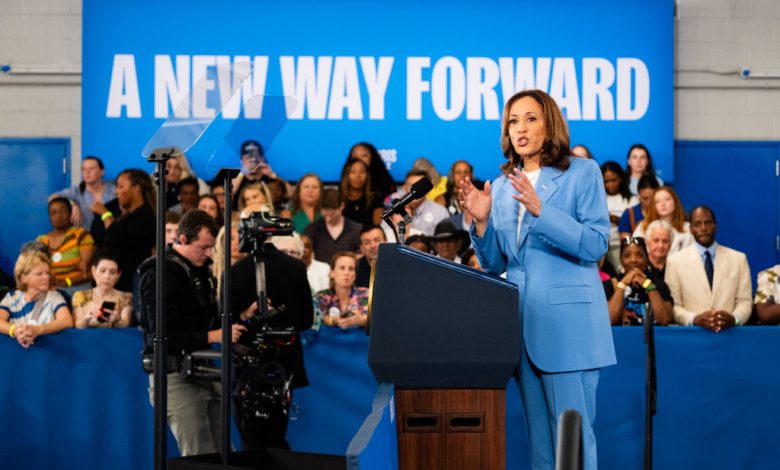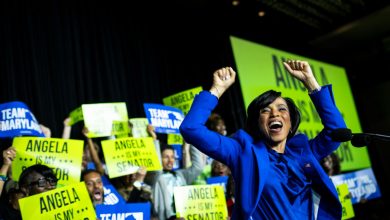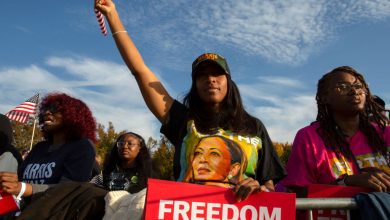Working Class Can’t Be Left Behind


Vice President Kamala Harris speaks to supporters in Raleigh, North Carolina, about her campaign’ economic policy agenda on August 16, 2024. | Source: The Washington Post / Getty
On Friday, in a fitting Carolina blue suit, Vice President Kamala Harris shared her economic vision in the first policy speech of her presidential campaign in Raleigh.
“This election, I do strongly believe, is about two very different visions for our nation,” Harris began her remarks. “One — ours — focused on the future and the other focused on the past. We see that contrast clearly in many ways, including when it comes to how we think about the economy.”
MORE: Why Fear About Kamala Harris’ Candidacy Is Misguided
“Together we will build what I call an opportunity economy,” Harris explained. “Everyone, regardless of who they are or where they start, has an opportunity to build wealth for themselves and their children.”
Harris touted the achievements of the Biden-Harris administration’s efforts to tackle inflation while acknowledging that some Americans “don’t yet feel that progress in their daily lives.”
That acknowledgment alone separates Harris from President Joe Biden, who would often take a more defensive tone – noting how much better America is doing much better when compared to similar nations based on his economic policies.
As Harris’ proposals, she called for the elimination of medical debt for millions of Americans; the “first-ever” ban on price gouging for groceries and food; a cap on prescription drug costs; a $25,000 subsidy for first-time home buyers, a move that her campaign estimated could reach 4 million households over four years; and a child tax credit that would provide $6,000 per child to families for the first year of a baby’s life.
“Donald Trump fights for billionaires and large corporations. I will fight to give money back to working and middle-class Americans,” Harris said.
Harris also urged action on a bill in Congress that would bar property owners from using services that “coordinate” rents.
However, of all the proposals in her 30-minute speech, what piqued my interest most was her plan to build 3 million more homes by 2029.
There is already debate as to how feasible Harris’ plan would be, but as others have noted, a presidential candidate putting the housing crisis in this country up as an issue is a feat unto itself.
As economist Mark Zandi recently wrote on X, formerly Twitter, “I’ve been a long-time observer of the economic policies proposed by presidential candidates. This is the only election in my memory that a candidate has put housing affordability front and center.”
I’m not of the mind that American voters are salivating for policy-focused campaign speeches as some members of the political press have suggested, but Harris nonetheless succeeded in launching an economic agenda voters can point to.
And to her credit, she does sound a lot more aware than her opponent.
During a recent call into his favorite morning show, Fox & Friends, Donald Trump was asked by a supporter what he planned to do with the high cost of living.
“Out of eight children that I’m a father and a stepfather to, five of them are struggling, and I’m giving them part of my income on a regular basis,” the Trump supporter explained. “How are you going to make the economy — not just the food and electricity — but bring down the rent prices, the housing prices, so that these kids can survive without their parents’ help?”
Trump answered by lying about the cost of bacon and promising to “drill, baby drill.”
By default, Harris wins this argument.
However, if I do have one slight complaint, it would be that I hope as Harris delivers more speeches about the economy, she escapes the modern generic Democrat tradition of speaking mostly about the middle class.
She talked a lot about “the middle class.”
To be fair, she herself said she grew up in a “middle-class household.” How her mother saved up for “well over a decade” to buy a home. How she worked at McDonald’s while she was in college to earn spending money.
(If it is the Georgia Avenue McDonalds near Howard University, I have several questions for her. And I salute her for her service because that location is not easy.)
That said, in future speeches, I hope there is greater emphasis on the working class and poor folks in this country who have been disproportionately burdened by inflation.
Kamala Harris delivered her speech well. And as promising as some of her proposals sound, when I think about the best remarks I’ve heard about the state of the economy this month, they do not come from any presidential candidate but from one Black woman who recently participated in a focus group organized by NBC News on Black Philadelphia voters.
When asked how hard has inflation been and who is to blame for it, she answered:
“I blame the federal government at this point. If a working class mom who works as a paralegal cannot buy a $2 bell pepper because it’s $5 now, imagine a mother living with food stamps? Imagine a mother working minimum wage trying to feed children.
“They’re killing us without killing us. If you understand that. They’re killing us without telling us they’re killing us. They’re hurting people in ways that they can’t help themselves. It’s either feed my child…feed my children or I don’t eat. But I have to go work.”
She got emotional as she said all of this. The pain in her voice was palpable and for many relatable. Very rarely have I seen any mainstream media outlet cover how much the rising cost of living has weighed on people in this way.
The voter spoke about the economy in the more dire terms that so many working-class Americans are currently experiencing – and certainly not in tones we often hear from our presidential candidates.
I don’t expect Kamala Harris to mirror that and start popping off about class warfare in future campaign speeches.
And again, I found Friday’s speech to be fine.
What I am saying, though, is that Harris’ speech was a good start. But as she plans to share more, I hope she considers becoming as much of a “joyful warrior” for working-class Americans as much as middle-class ones.
As voters on both sides are telling us through the press, they’re looking for more advocacy.
Michael Arceneaux is a New York Times bestselling author whose most recent book, “I Finally Bought Some Jordans,” was published in March.
SEE ALSO:
Do VP Kamala Harris And Tim Walz Have What It Takes To Bring Change To America?





